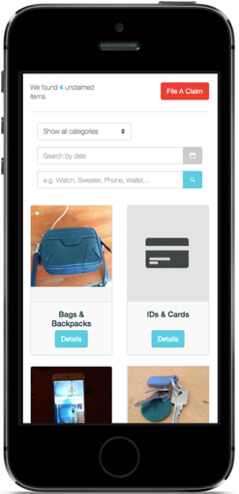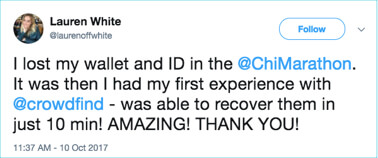When attendees leave conferences, festivals, and business events, organizers hope their journeys home are filled with a sense of satisfaction for investing their time and money in the program. However, some attendees may find those good feelings overshadowed by a sense of dread over losing or misplacing their purses, phones, credit cards, or other important personal items during the event.
To the rescue: Chicago-based Crowdfind, which is aiming to update the archaic lost-and-found process at events. Crowdfund’s general manager, Dan Sullivan, said that while that might seem like a “boring and innocuous” detail to a lot of people, he sees it as an opportunity to create a better experience for attendees.

Today’s most advanced lost-and-found services might use a spreadsheet to track items, he said. “In most cases, though, they’ll just put a box out and attendees can claim items if they want. It’s not an efficient approach to solving problems for attendees.”
Rather than invite attendees to comb through a mountain of misplaced items, Crowdfind posts photos of each item in a lost-and-found inventory with a time-stamped log of the item. The photo library integrates with an event’s or a venue’s website where attendees can identify their property. It’s simple enough, and it works: Chicago’s Navy Pier — the first venue to work with the company — has seen a 50-percent increase in its number of returns since June 2014.
The Lifespan of Lost and Found
The platform seems like an easy solution for attendees who realize that they’ve lost their belongings while still on site, but what about those who discover that something is gone once they’re home?
Sullivan said that it’s up to event organizers to hold on to those items. “Certain states have specific lost-and-found laws,” Sullivan said. “What we generally recommend is to hold on to things for 60 to 90 days.”

Crowdfind’s services include the storage and shipping of those goods at its warehouse and processing center in Chicago’s Bridgeport neighborhood — something the organizers of the most-recent Bonnaroo Music & Arts Festival took advantage of. Event organizers pay Crowdfind to ship items back to attendees, but there’s also “an important security component to it, too,” Sullivan said. “If there are unclaimed phones, we wipe their data, and we make sure that any sensitive items [like unclaimed credit cards] are shredded.”
Coming to a Convention Center Near You
Sullivan said that Crowdfind is currently working with other major music festivals including Coachella and Lollapalooza, and a number of LiveNation venues have started using it for their lost-and-found services, too. Now, the technology is beginning to show up on the business-events industry’s radar. Sullivan said that six convention centers have contacted the company in the past few months, and he believes that the technology can play a role in helping venues and event organizers accomplish their shared top priority: keeping attendees happy. “This is a chance to address an easily forgotten part of customer service,” he said, and for planners “to shine in an unexpected way.”
To learn more about Crowdfind, visit the company’s website here.
